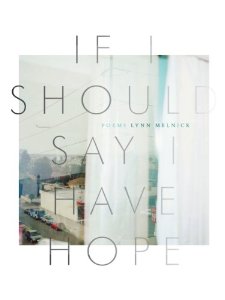 |
Comment on this
article

If I Should Say I Have Hope
by Lynn Melnick
45 poems/ 90 pages/ $16.00
YesYes Books
yesyesbooks.com
Reviewed by: Ed Bennett
Years ago it was not uncommon for youth groups to have a boy's boxing program. It stressed the
fundamentals of "clean fighting" by teaching techniques popularized by the Marquis of Queensbury
before he sucker punched Oscar Wilde. Part of the technique was learning to use jabs to keep your
opponent off balance and set them up for a final, match winning blow. Lynn Melnick's poetry uses
this technique as flawlessly as any experienced boxer. Her latest book, If I Should Say I Have
Hope, is a fine example of this particular craft.
At the risk of sounding like some superannuated reviewer, I came away from reading this book as
much impressed by her wisdom as by her candor. This is no mean feat for a writer in her early 30s.
It is difficult to tease the two apart because her delivery is given with the suddenness of a jab
and, once done, Ms. Melnick keeps moving toward her point without looking back. The result is a
collection of poems that are not only well crafted but delivered with an obvious self assurance of
a champion.
In her poem "There Was a Child Who Never Wanted" the narrator speaks directly:
"And here’s yours truly, speaking of love, again.
How ordinary. I’m afraid I’m untrussed and strutted:
hold me. And don’t be ridiculous."
Simply speaking of love is "ordinary". The narrator demands that these ordinary words take life in action
with the direct command “hold me” followed by the remonstration “And don't be ridiculous". These last two
jabs set up the remainder of the poem and ends with the simple declarative
"….I want
nothing expected of me and my morning."
The voice in these poems has the sound of an older sibling explaining life to her younger ones. In
"On Being Lost Forever" the narrator speaks truth to naiveté
"…Foolish girl,
you think you will be a sweeping force and the world
will be kind. Tune in tomorrow for the gruesome conclusion.
You should see it now because I see it now. Pick it up.
You wouldn’t know happy if it kissed you on the mouth."
Again, the lines are punctuated with short, direct sentences. From the standpoint of her subject's
self importance, the narrator disabuses them of that notion and presents reality with the colloquial
"tune in tomorrow" to point to the future. There will be no argument because everyone can see it.
The final line comments on the skewed reality that has been dismissed.
Ms. Melnick’s candor is evident even in more tender moments. In her moving poem "Mojave" she tells
her reluctant lover
"…I cannot drive as you did, but I can wipe
your mouth, cover your punctured arm with your sleeve. I will not watch you
die on the carpet. It would be as if I had never been here."
Rather than appear as a victim of a feckless love, the narrator morphs from lover to prophet with
the words:
"You pick up every glowing penny, let them burn your hands
unrecognizable until you find yourself holding out your luck….
So when you arrive at another
unbroken wild, dust left dust under feet, you will say to yourself:
What haven't I known? Who haven’t I loved all my life."
If you are looking for a collection of poetry with allusions to gentle zephyrs and lover's tears, this
is not a book for you and I would not recommend it. With that said, this is a book that is unique in
its diction and clarity and I do recommend it for those who like their poetry direct and well crafted.
The phrasing is in accessible language and the way Ms. Melnick expresses basic emotions is exciting. Many
of her poems can be found on the internet and are definitely worth the time to read. It is rare that I have
been so excited about a poet and I do anticipate her next collection.
Return to:
©
2001- 2013, Quill & Parchment
Productions
All
contributions are copyright of the respective authors |


